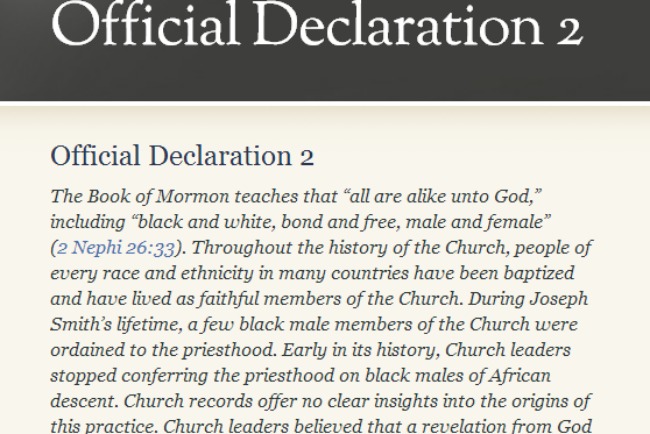Question
Gramps,
Can someone tell me the difference between an official declaration from the Prophet and a change in policy and how it affects church doctrine?
Rod
Answer
Rod,
While questions like this are interesting to wrap our intellectual muscles around, I often find that such a question tends to either create distinctions where none exist or exaggerate differences that are often quite small. It is important that we approach these types of questions with the Spirit of Inspiration, seeking out a better understanding of the Lord’s will, rather than with the attitude of linguistic legerdemain to squeeze out a justification for disobeying the Lord’s will.
Whether it is a Church Publication (like the Church Handbook of Instructions) or whether it is a canon of scripture, it is still considered the revealed word of God. They simply serve different purposes. The Official Declarations are part of our canon of scripture. “Canon” comes from the Greek word meaning “measuring stick” or “rule”. Indeed, we call them our “Standard Works” for a reason.
“They are the standards by which we measure all doctrine and if anything is taught which is contrary to that which is in the scriptures, it is false. It is just that simple”
–Harold B. Lee, “Viewpoint of a Giant”, 18Jul1968
Changes to our canon are a rare occurrence. They have to be if we are to use them as a measuring stick. Only 3 sections and two official declarations have been added to our canon since the death of Joseph Smith. In each case, there was either new doctrine to be declared or a major change in direction for the Church beliefs and practices.
Changes in Church policy (as contained in the Church Handbook for instance) are much more frequent. The Church Handbook of Instructions is a formal document defining the policies and procedures in the running of the Church as an organization.
“While handbooks do not have the same standing as the scriptures, they do represent the most current interpretations and procedural directions of the Church’s highest authorities”
–Dallin H. Oaks, “Overview of the New Handbooks”, 2010 Worldwide Leadership Training.)
They do not present new doctrines, nor do the policies affect us on a daily basis. But they may crystallize formal application of existing doctrines. And they are not necessarily used as a measuring stick for other doctrines or beliefs. They change commonly due to utility (such as the introduction of new technology to the process) or practicality (such as the 3-hour block). But they usually show no real change in direction, only the way in which we are walking the same path with different tools as they become available.
Within the Handbook we find some purely perfunctory matters such as the duration of each meeting of the 3-hour block. We also find some highly spiritual matters such as defining what constitutes apostasy or the procedures for approving baptismal candidates. For either extreme or all points in between, the policies have been discussed, debated, prayed about, and revelation received on how the Church is to be run. Their goal is to “facilitate revelation (as) they are used to provide an understanding of principles, policies, and procedures to apply while seeking the guidance of the Spirit.” (Handbooks 1&2, 2010).
It may seem strange to think that something so mundane as the 3-hour block would need to be confirmed by revelation. But the same God who notices a sparrow’s fall is indeed involved in the nuts and bolts of the most important organization on this earth – the Church which bears both his name and that of his covenant people. Would he be making such mundane decisions? The fact is that he does, through his prophets and apostles.
“Whether by mine own voice or by the voice of my servants, it is the same.”
–D&C 1:38
Statements and even entire books are written by individual representatives of the Lord giving their personal opinions and interpretations on many matters both trivial and profound. But when these same representatives are acting in an official capacity and providing words of instruction through the Spirit of Revelation, we must seek out the Lord’s confirmation of their words, that they are indeed from the Lord, Himself – even if they comment on a sparrow’s fall.
Gramps






